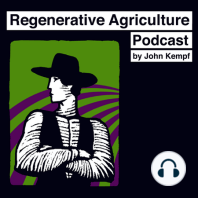10 min listen

Episode 99: Reshaping How Agriculture Sees Plant Nutrient Uptake With Dr. James White
Episode 99: Reshaping How Agriculture Sees Plant Nutrient Uptake With Dr. James White
ratings:
Length:
75 minutes
Released:
Jan 11, 2024
Format:
Podcast episode
Description
Dr. James White is a professor of Plant Pathology at Rutgers University. Dr. White obtained an M.S. in Mycology and Plant Pathology from Auburn University and a Ph.D. in Mycology from the University of Texas at Austin in 1987. Dr. White specializes in symbiosis research, particularly endophytic microbes. He is the author of more than 180 articles and author and editor of reference books on the biology, taxonomy, and phylogeny of fungal endophytes, including Biotechnology of Acremonium Endophytes of Grasses (1994), Microbial Endophytes (2000), The Clavicipitalean Fungi (2004), The Fungal Community: Its Organization and Role in the Ecosystem (2005), and Defensive Mutualism in Microbial Symbiosis (2009). The overall hypothesis of this research is that bacterial and fungal endophytes of the plant microbiome function to defend plants from stress and provide nutrients that enhance the growth and development of plants. In this episode, James and John discuss: How plants get nutrients through the rhizophagy cycle Important microbes lost from commercial seed production Indigenous wisdom in seed production Bacteria changing the behavior of fungal populations through nutrients How endophytes benefit plants Reshaping agriculture to be based on how plants actually grow How plants cannot grow without microbes in their cells Additional Resources To take the course led by Dr. James White that teaches the Rhizophagy cycle, please visit: https://kindharvest.ag/courses/ra-ur-understanding-rhizophagy/ About John Kempf John Kempf is the founder of Advancing Eco Agriculture (AEA). A top expert in biological and regenerative farming, John founded AEA in 2006 to help fellow farmers by providing the education, tools, and strategies that will have a global effect on the food supply and those who grow it. Through intense study and the knowledge gleaned from many industry leaders, John is building a comprehensive systems-based approach to plant nutrition – a system solidly based on the sciences of plant physiology, mineral nutrition, and soil microbiology. Support For This Show & Helping You Grow Since 2006, AEA has been on a mission to help growers become more resilient, efficient, and profitable with regenerative agriculture. AEA works directly with growers to apply its unique line of liquid mineral crop nutrition products and biological inoculants. Informed by cutting-edge plant and soil data-gathering techniques, AEA’s science-based programs empower farm operations to meet the crop quality markers that matter the most. AEA has created real and lasting change on millions of acres with its products and data-driven services by working hand-in-hand with growers to produce healthier soil, stronger crops, and higher profits. Beyond working on the ground with growers, AEA leads in regenerative agriculture media and education, producing and distributing the popular and highly-regarded Regenerative Agriculture Podcast, inspiring webinars, and other educational content that serve as go-to resources for growers worldwide. Learn more about AEA’s regenerative programs and products: https://www.advancingecoag.com/ ~ VIDEO: To learn more from John Kempf about regenerative agriculture, watch this conversation between John and three AEA grower partners about how regenerative agriculture is changing lives and conventional farming: https://youtu.be/n9U6GwbYPDk
Released:
Jan 11, 2024
Format:
Podcast episode
Titles in the series (98)
3 Things To Do When Plants Don't Respond to Nutrient Applications: 3 Things To Do When Plants Don't Respond to Nutrient Applications with John Kempf by Regenerative Agriculture Podcast